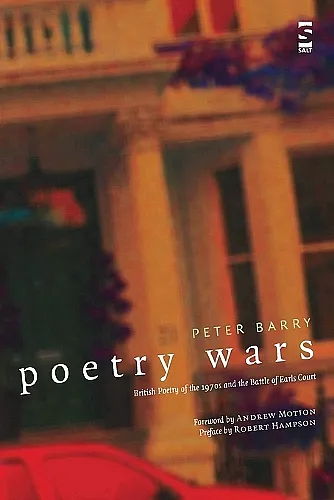Poetry Wars
British Poetry of the 1970s and the Battle of Earls Court
Format:Paperback
Publisher:Salt Publishing
Published:1st Jun '06
Currently unavailable, and unfortunately no date known when it will be back

Poetry Wars fills a major lacuna in the annals of twentieth-century British poetry. For a brief period in the seventies, the National Poetry Society, the emblem of the Establishment, was taken-over by a cadre of "radicals" led by the late Eric Mottram, a cadre that not only introduced the American avant-garde (from the Objectivists to Black Mountain and the San Francisco school) to British readers, but noted that its British counterpart had been there all along, just waiting to be discovered. By 1980 or so, normalcy had reasserted itself, but the "poetry wars" had merely gone underground, and today, on the Anglophone scene, their impact is being felt everywhere. Peter Barry has done a masterful job in telling what is an absorbing and important tale. His richly documented history is one anyone interested in 20th Century British Poetry will want to read. -- Marjorie Perloff Vanity, paranoia, booze and petty corruption: they are all here. As a warning to future poets. Never mix with bureaucrats. Destroy your correspondence. And count your fingers after shaking hands with the Arts Council. -- Iain Sinclair
Poetry Wars describes the battle at the National Poetry Society during the 1970s between radicals and conservatives, which had lasting effects on British poetry.
Poetry Wars is an account of the six-year battle at the National Poetry Society during the 1970s when this highly conservative institution and its journal Poetry Review were taken over by radical poets. The story is told from primary sources, including the Arts Council’s Records at the Victoria & Albert Museum, the Eric Mottram Archive at King's College London, and the Barry MacSweeney Collection at Newcastle University, and from contemporary newspaper accounts.
The story has never been made public before in documentary detail, though brief reference is often made to it in accounts of contemporary poetry, and anecdotes and hearsay about these events have been in circulation for over twenty years. The repercussions continue to reverberate, and struggles of the same nature continue in the Poetry Society and other cultural institutions today. The question of how an avant-garde ‘negotiates’ with the ‘centre’ it seeks to displace remains crucial, and this issue is of increasing importance to the study of literature and the arts in the twentieth and twenty first centuries.
The book is in three sections: the first, ‘Chronology’ (chapters 1-5), tells the story of the events; the second, ‘Themes’ (chapters 6-9), considers the events from various thematic viewpoints, and includes a detailed chapter on the writing, teaching, and editing practice of Eric Mottram, and another on the characteristics of the ‘British Poetry Revival’ of the 1970s. The third section, ‘Documents’, reproduces a series of contemporary documents from the relevant archives, along with new summary data about the personalities involved.
ISBN: 9781844712472
Dimensions: 228mm x 152mm x 16mm
Weight: unknown
276 pages